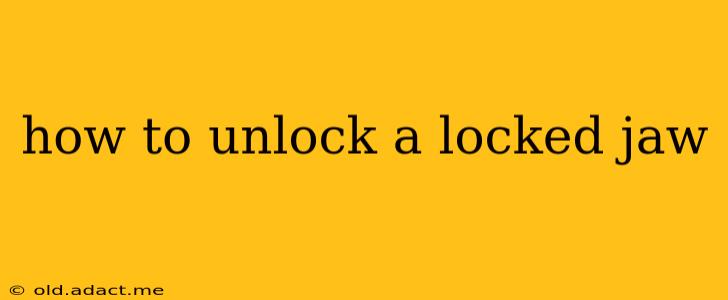A locked jaw, also known as trismus, is a condition where you can't fully open your mouth. It can range from mild discomfort to severe pain and immobility. Understanding the causes, implementing appropriate treatments, and practicing preventive measures are crucial for managing this condition effectively. This comprehensive guide will explore the various aspects of a locked jaw, providing you with the information you need to address it properly.
What Causes a Locked Jaw?
Several factors can contribute to a locked jaw. Identifying the underlying cause is essential for effective treatment.
Common Causes:
- Temporomandibular Joint (TMJ) Disorders: Problems with the TMJ, the joint connecting your jaw to your skull, are a frequent culprit. This could include inflammation, dislocation, or injury to the joint.
- Muscle Spasms: Prolonged clenching or grinding of teeth (bruxism), stress, or injury can lead to painful muscle spasms that restrict jaw movement.
- Dental Procedures: Dental work, particularly wisdom teeth extractions or oral surgery, can sometimes trigger temporary jaw stiffness or locking.
- Infections: Infections in the mouth, jaw, or surrounding areas (e.g., abscesses, cellulitis) can cause significant pain and restrict jaw movement.
- Trauma: A blow to the jaw or a facial injury can result in a locked jaw.
- Certain Medical Conditions: Conditions like tetanus, stroke, or trigeminal neuralgia can sometimes manifest as jaw stiffness or locking.
How Can I Unlock My Jaw?
Treatment for a locked jaw depends heavily on the underlying cause. Self-treatment is only advisable for minor cases, and it's always best to consult a medical professional for diagnosis and management.
Self-Care Measures (for mild cases only):
- Gentle Jaw Exercises: Slowly open and close your mouth, performing these exercises gently and repeatedly throughout the day. Avoid forcing your jaw.
- Heat or Cold Packs: Applying a warm or cold compress to your jaw for 15-20 minutes at a time can help relieve pain and muscle tension. Experiment to see which works better for you.
- Over-the-Counter Pain Relief: Nonsteroidal anti-inflammatory drugs (NSAIDs) like ibuprofen can help manage pain and inflammation. Always follow the recommended dosage.
- Stress Management: If stress is a contributing factor, practice relaxation techniques such as deep breathing exercises, yoga, or meditation.
Medical Treatments:
- Medication: Your doctor might prescribe muscle relaxants, pain relievers, or antibiotics (if an infection is present).
- Physical Therapy: A physical therapist can teach you specific exercises and techniques to improve jaw mobility and reduce pain.
- Dental Splints or Mouthguards: These devices can help protect the TMJ and prevent further damage.
- Surgery: In rare cases, surgery may be necessary to correct severe TMJ disorders or other underlying causes.
What are Home Remedies for a Locked Jaw?
While home remedies can offer temporary relief for minor cases, they are not a substitute for professional medical attention. Attempting to forcefully manipulate your jaw at home could worsen the condition. The self-care measures mentioned above—gentle jaw exercises, heat/cold packs, and over-the-counter pain relief—are the safest options for home management.
How Long Does a Locked Jaw Last?
The duration of a locked jaw varies depending on the cause and the severity of the condition. Minor cases related to muscle spasms or temporary inflammation might resolve within a few days to a couple of weeks with self-care. More severe cases, particularly those caused by underlying medical conditions or significant trauma, may require longer treatment and could last for several weeks or even months.
When Should I See a Doctor for a Locked Jaw?
You should seek medical attention if:
- Your jaw locking is severe or persistent.
- You have significant pain or swelling.
- You have difficulty eating, drinking, or speaking.
- You suspect an infection.
- You experienced trauma to the jaw.
- Symptoms don't improve after a few days of self-care.
Delayed treatment can lead to complications, so don't hesitate to consult a doctor if you're experiencing concerning symptoms. A prompt diagnosis and appropriate treatment plan are essential for optimal recovery.
Can a Locked Jaw Be Prevented?
While not all causes of a locked jaw are preventable, some measures can reduce your risk:
- Manage Stress: Practice stress-reducing techniques regularly.
- Protect Your Jaw: Wear a mouthguard during contact sports.
- Maintain Good Oral Hygiene: Practice regular brushing and flossing to prevent oral infections.
- Avoid Clenching or Grinding Your Teeth: Be mindful of your jaw position and use relaxation techniques to address bruxism.
- Seek Prompt Treatment for Dental Issues: Address any dental problems immediately to avoid complications.
Remember, this information is for general knowledge and should not be considered medical advice. Always consult a healthcare professional for diagnosis and treatment of a locked jaw or any other medical condition.
